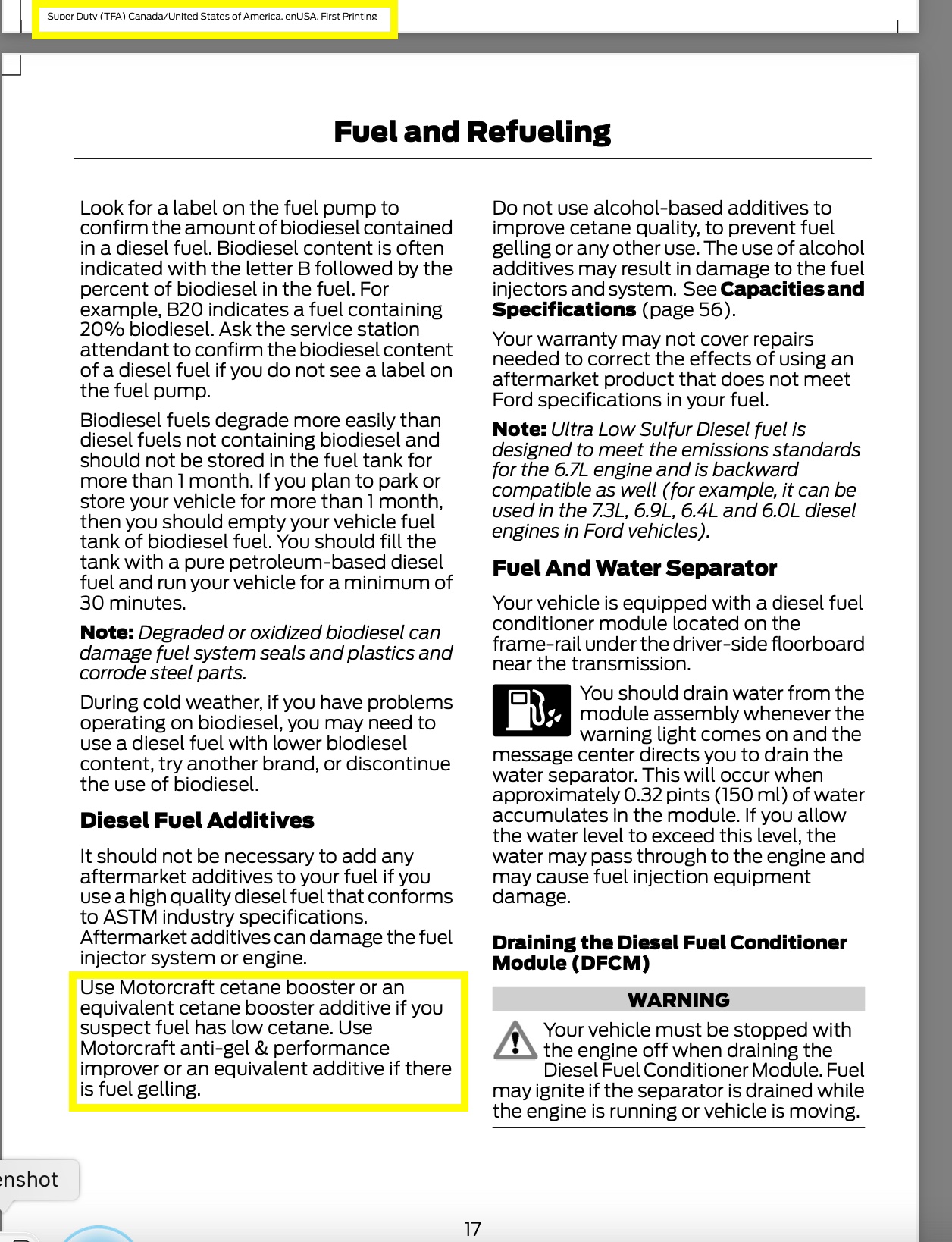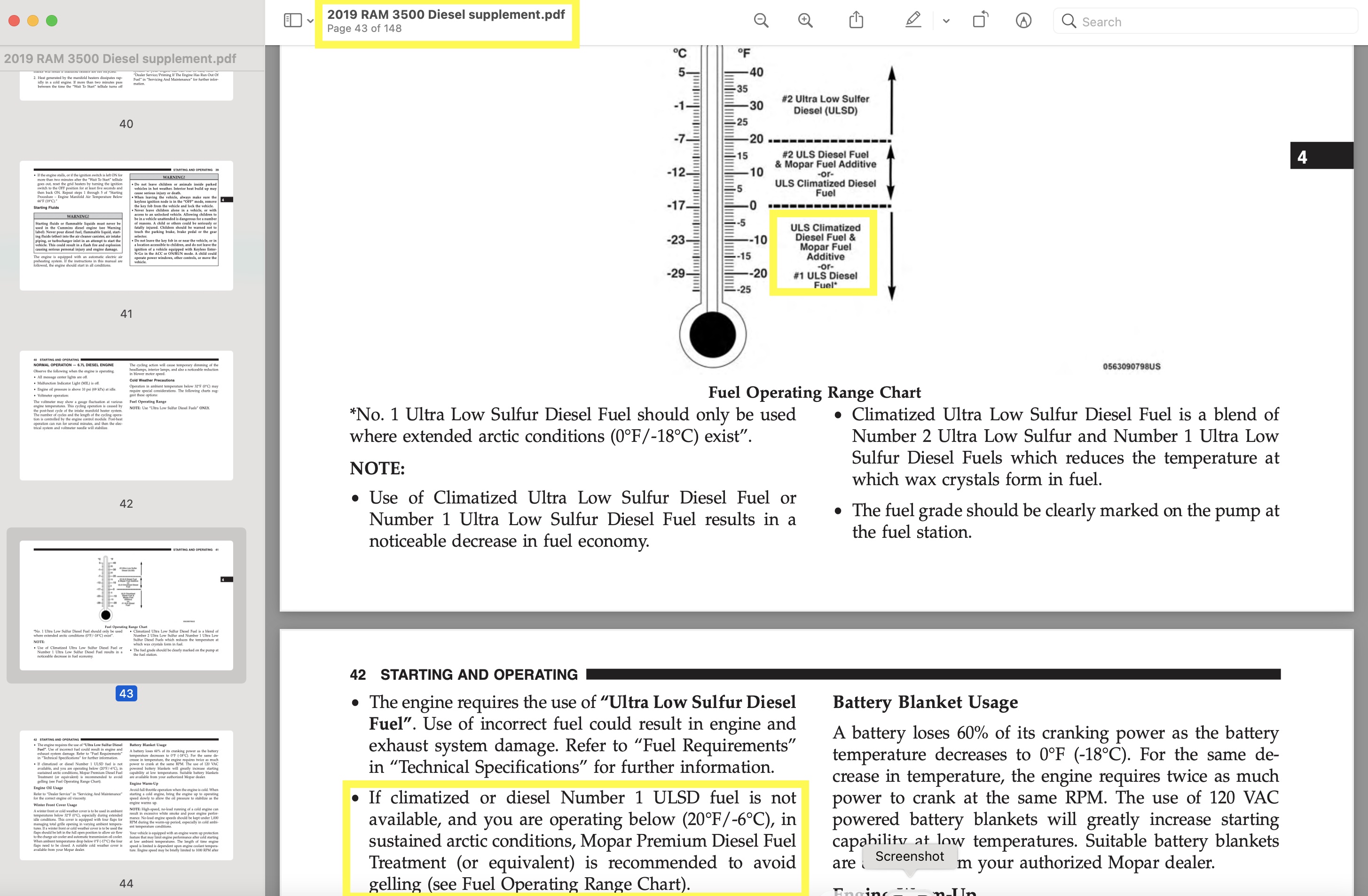Finally was able to find a PDF version of this service bulletin from my Quickserve. Many times I can see these service bulletins on my Cummins Quickserve login, but I cannot post them on forums because I have no means of making them web viewable
Here is what Cummins says on the matter...
Fuels for Cummins Engines Note that they say this right before they list the minimum fuel requirements.
"
This section presents the Cummins Inc. required fuel specifications.
Fuels meeting national and international specifications can be used if they observe the
specifications listed in Table 1: Cummins Inc. Required Diesel Fuel Specifications. Cummins®
engines will operate satisfactorily on fuels meeting all the properties listed in Table 1;
however, fuels meeting only the required specifications will not give the same level of performance,
efficiency, reliability, or maintenance costs as premium fuels
"
Looking at the table, the minimum cetane for temps above 32F is 42 and 45 below 32F. The federal standard that most states use(besides Texas and California) has a minimum cetane rating of 40. So in these other states, you may even be using fuel that doesn't meet Cummins' minimum fuel quality and therefore additional additives may be needed to bring that fuel up to these standards.
They clearly state that a greater cetane rating will improve performance and efficiency. They also discuss carbon buildup and what it does to the engine.
Here is what they say regarding additives.
"
Cummins® engines are designed, developed, rated, and built to operate on commercially
available diesel fuel as listed in Table 1: Cummins Inc. Required Diesel Fuel Specifications;
therefore, it is not our policy to recommend fuel additives.
In certain situations, when available fuels are of poor quality or problems exist which are
peculiar to certain operations, additives can be used. However, Cummins Inc. recommends
consultation with the fuel supplier or Cummins Inc. Service Engineering Department prior to
the use of fuel additives.
Among the situations where additives can prove useful are the following:
1. A cetane improver additive can be used with low cetane fuels.
2. A pour point depressant or flow improver additive can help with high pour point fuels.
3. A wax crystal modifier can help with fuels with high cold filter plugging points (CFPP).
4. An anti-icer can help prevent ice formation in wet fuel during cold weather.
5. An anti-oxidant or storage stability additive can help with fuel system deposits and poor
storage stability.
6. A lubricity enhancer can be used to increase the lubricity of fuels so that they meet the
specifications in Table 1: Cummins Inc. Required Diesel Fuel Specifications.
7. A biocide or fungicide can help when fuels are prone to contamination with bacteria or
fungus. Although other additives can provide some performance benefits, Cummins
Filtration™ Kathon FP 1.5 Microbicide (quart - CC2661 and gallon - CC2663) is the only
product approved by Cummins Inc. to treat fuels with biological contamination problems.
8. Cummins Filtration™ Turbo Diesel All Season Fuel Additive (pint - CC2588) can be used
with low cetane fuels to boost cetane values. Although other additives are available that
will boost the cetane number, Cummins Filtration™ Turbo Diesel All Season Fuel
Additive is the only diesel fuel additive approved by Cummins Inc. for cetane number
improvement.
9. Cummins Filtration™ Asphaltene Conditioner Base (pint - CC2598, quart - CC2597, 5
gallons - CC2549, and 55 gallons - CC2550) and Asphaltene Conditioner Concentrate
(2.5 gallons - CC2596, Bulk - CC2559) or Cummins Filtration™ Turbo Diesel All Season
Fuel Additive (pint - CC2588), can be used to clean carbon deposits from injectors and
improve lubricity in fuels that fall below the recommended lubricity specification in Table
1: Cummins Inc. Required Diesel Fuel Specifications. Although other additives can
provide some performance benefits, Cummins Filtration™ Asphaltene Conditioner, and
Turbo Diesel All Season Fuel Additive are the only diesel fuel additives approved by
Cummins Inc. for use with fuels that do not meet the lubricity specification in Table 1...
"
BTW, this service bulletin was updated in 2017, but nothing changed in regards to what is quoted.

